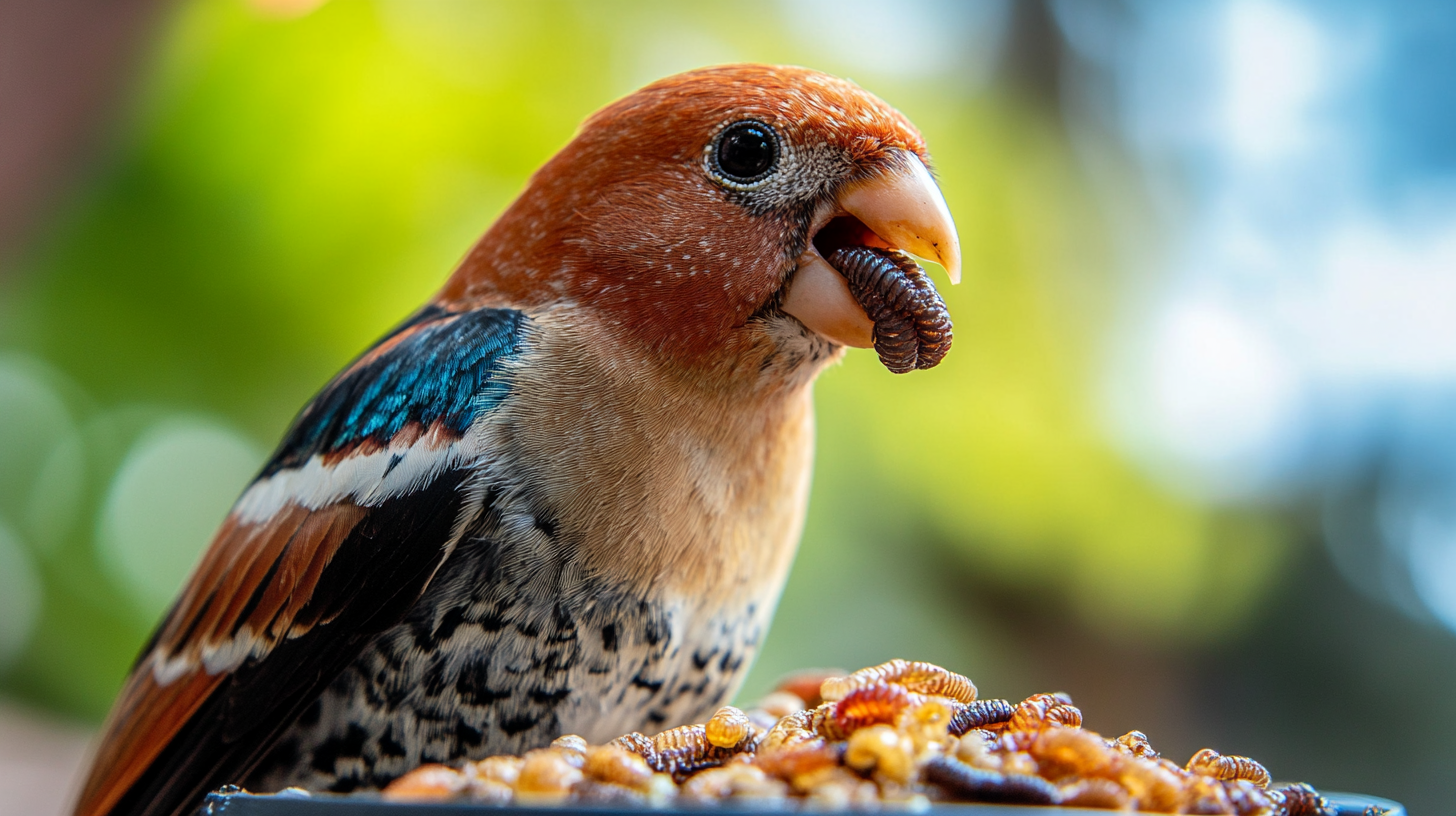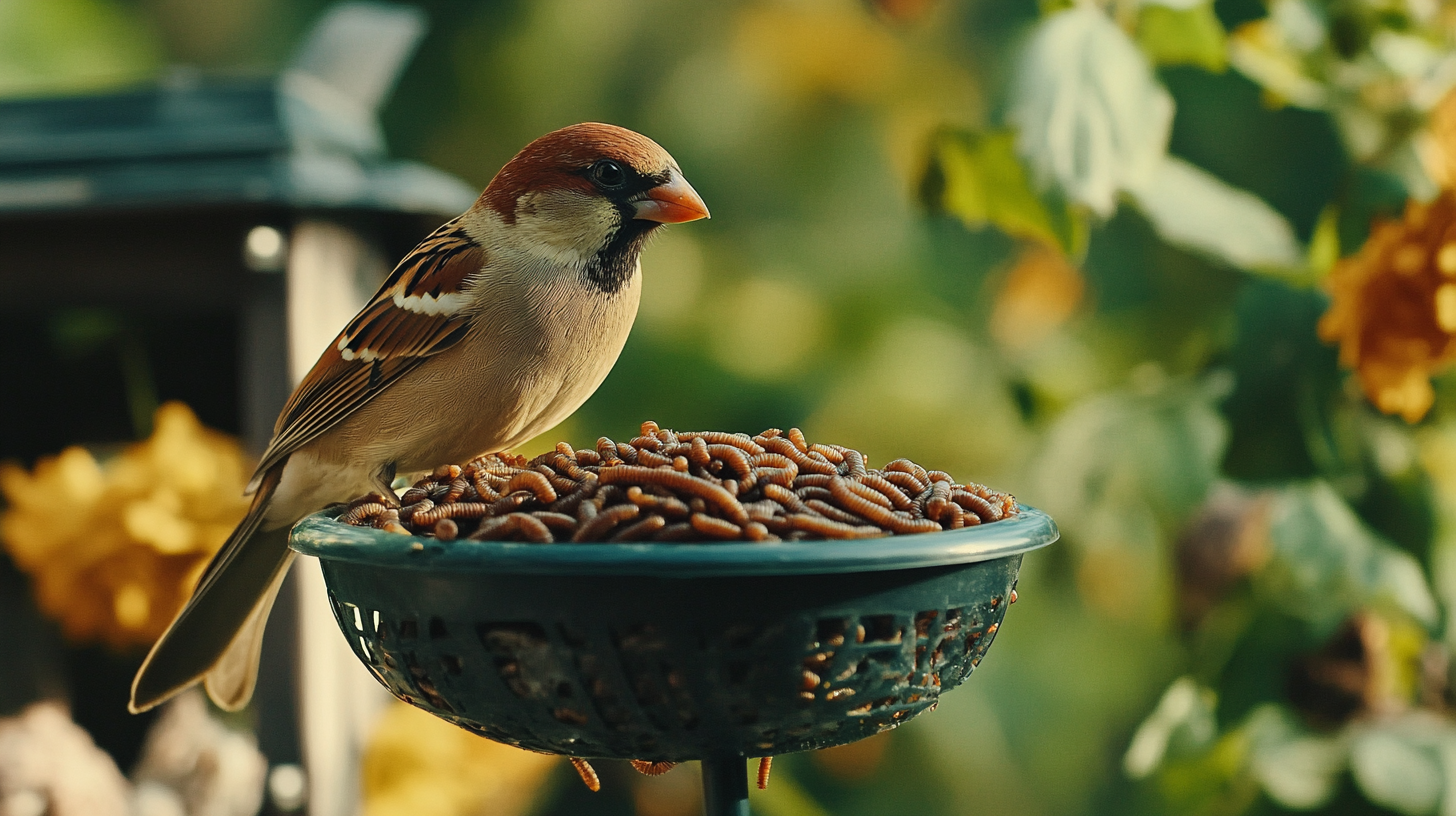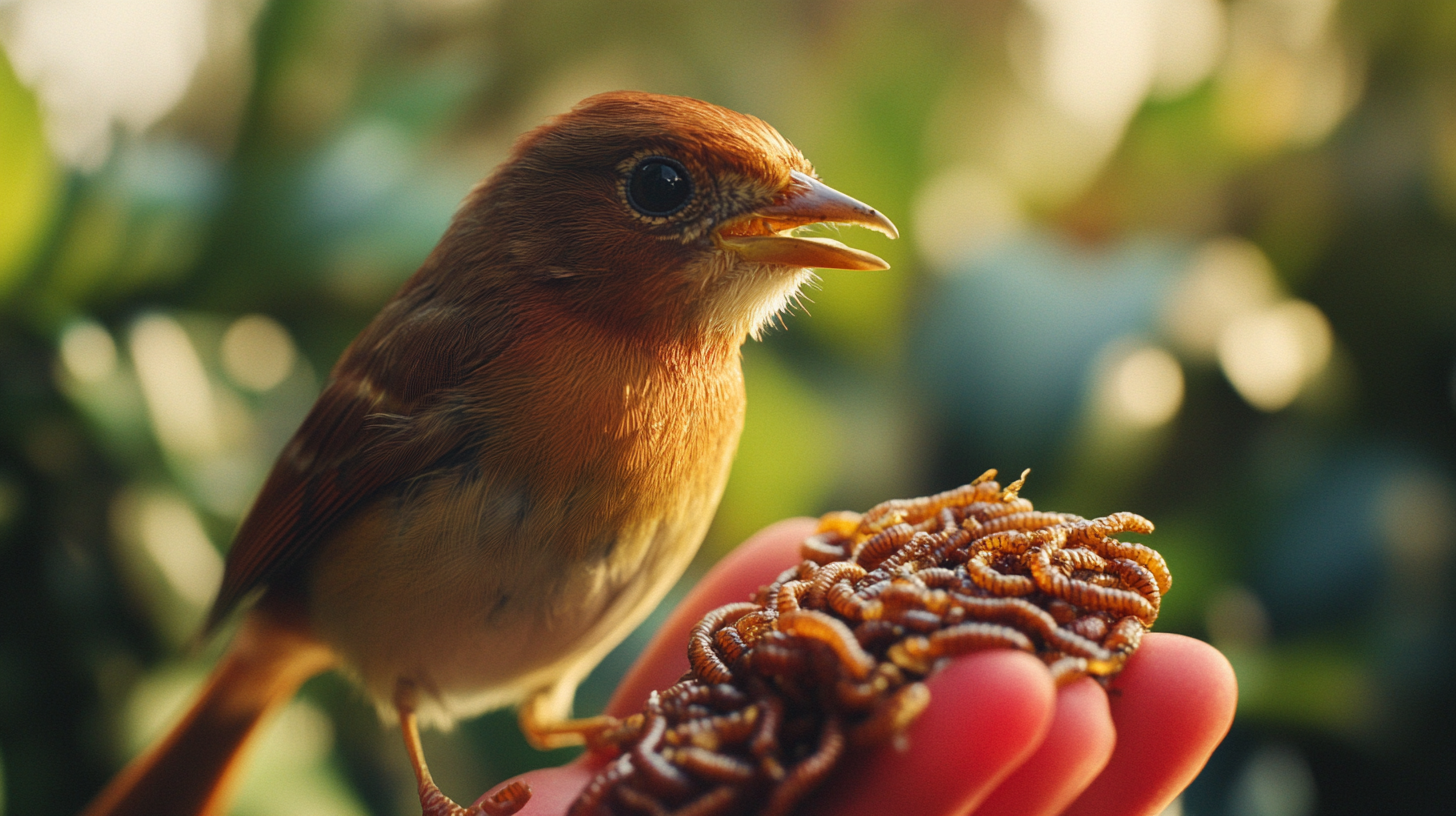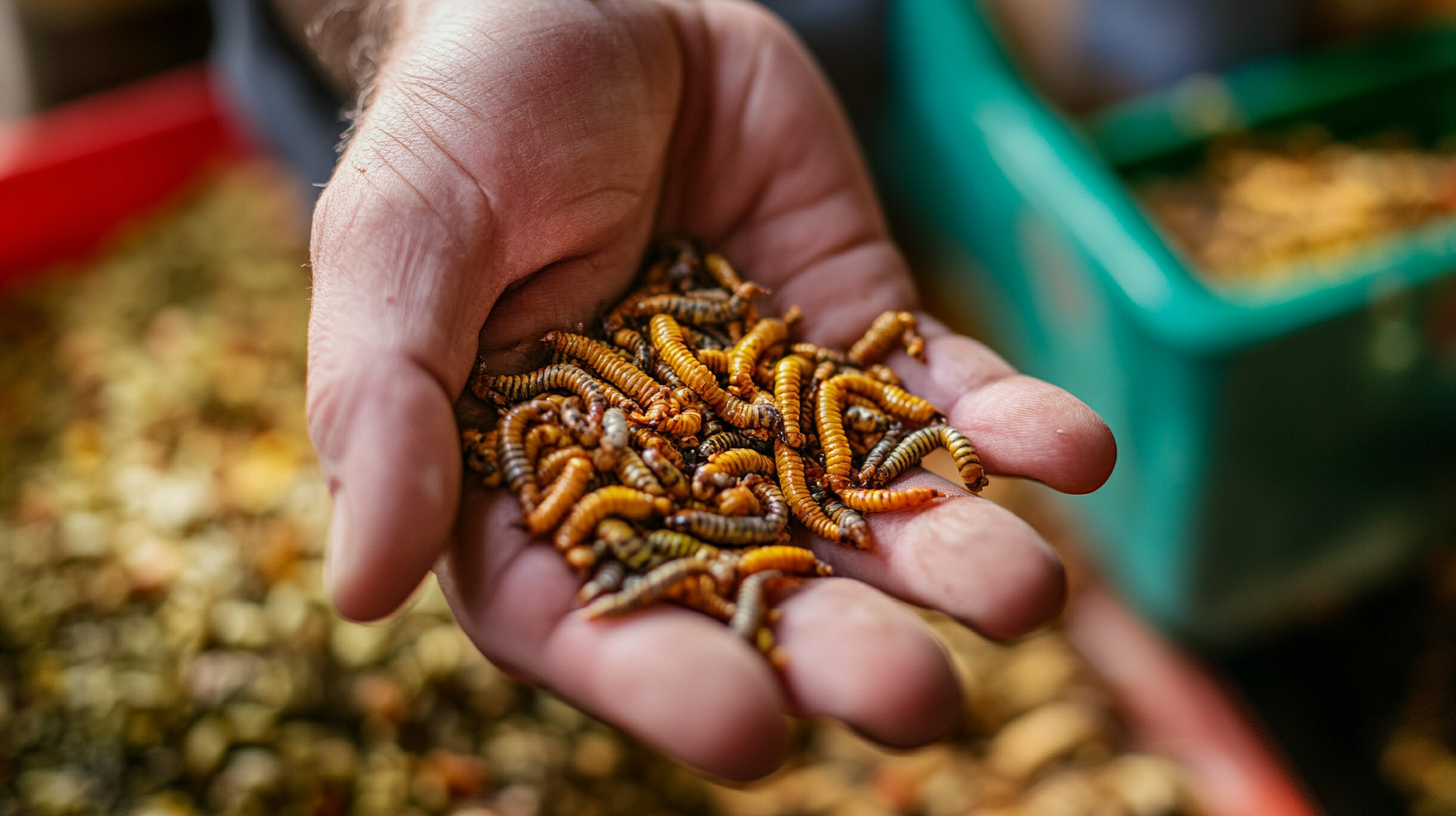As bird enthusiasts continuously seek innovative ways to enhance the nutrition and wellbeing of their feathered friends, the incorporation of meal worms into their bird food supply is gaining significant attention. Meal worms bird food not only provides essential protein but also mimics the natural diet of many wild bird species, making it an attractive option for those looking to foster a healthier avian community in their backyards. By exploring the various benefits of adding these nutritious larvae to bird feeders, we can help our avian companions thrive.
Beyond just serving as a high-energy snack, meal worms offer a variety of advantages, including promoting vibrant plumage and increasing breeding success among birds. This blog aims to delve into the numerous benefits of incorporating meal worms bird food, illustrating how these tiny creatures can transform your bird feeding experience. Whether you’re a seasoned bird watcher or a newcomer to avian care, understanding the potential of meal worms will inspire you to make informed decisions for your feathered friends’ diets.

Meal worms are quickly gaining recognition as a nutritional powerhouse in the avian diet. Packed with protein, essential fatty acids, and vitamins, these larvae serve as an excellent supplement to traditional birdseed. Birds require a balanced diet to thrive, and the inclusion of meal worms can help meet their dietary needs, especially for those species that are naturally insectivorous. By incorporating meal worms into their food supply, bird enthusiasts can help their feathered friends maintain higher energy levels and improved overall health. One of the significant nutritional advantages of meal worms is their high protein content. Protein is essential for feather growth, muscle development, and overall vitality. Meal worms contain about 50% protein, making them an ideal choice for birds during breeding seasons when their nutritional demands increase. Additionally, meal worms are rich in fat, providing birds with essential energy sources that promote their active lifestyles. This combination of protein and fat is particularly beneficial for fledglings and stressed birds, giving them the extra energy they need to develop and recover. Furthermore, meal worms are a source of important vitamins and minerals, including B vitamins, calcium, and phosphorus. These nutrients contribute to healthy bone development and support metabolic processes within the birds. The natural composition of meal worms can enhance the nutritional value of a bird's diet, ensuring that they receive a well-rounded intake of essential nutrients. As more bird enthusiasts discover the benefits of meal worms, they are becoming an increasingly popular choice for those looking to improve the health and vitality of their avian companions.

In recent years, bird enthusiasts have explored various ways to enhance avian wellness, and one of the most effective additions is mealworms. These nutrient-dense larvae are not only a natural source of protein but also offer vital fats and essential amino acids that contribute to the overall health of birds. Incorporating mealworms into your bird food supply can lead to noticeable improvements in their energy levels, plumage quality, and overall vitality.
Mealworms are an excellent source of nutrition, especially for growing chicks and breeding birds. The protein content helps in muscle development and feather growth, while the fats provide the necessary energy for active birds. As birds consume mealworms, they benefit from the rich nutrients that support their immune system. This boosts their resilience against illnesses and promotes longer, healthier lives.
Moreover, birds find mealworms irresistibly delicious, which encourages them to explore their feeding habits and enhances their foraging instincts. This aspect of natural behavior not only adds excitement to their feeding routine but also stimulates their minds. By diversifying their diet with mealworms, bird owners can ensure that their feathered friends remain lively, vibrant, and full of vitality, ultimately leading to a thriving avian community in your garden or backyard.

In recent years, the emphasis on sustainability has led to an exploration of alternative protein sources, particularly for bird food. Meal worms, the larvae of the darkling beetle, have emerged as a sustainable option that not only provides essential nutrition for birds but also offers significant environmental benefits. According to a study published in the journal *Sustainable Agriculture Reviews*, meal worms have a much lower carbon footprint compared to traditional livestock farming—a staggering 1/100th of the greenhouse gas emissions associated with beef production.
Moreover, meal worms can be raised on organic waste products, transforming what would otherwise be discarded into valuable protein. A report from the Food and Agriculture Organization (FAO) suggests that utilizing food waste for insect farming could reduce waste by up to 30%, while simultaneously contributing to food security. This circular economy concept exemplifies how incorporating meal worms into bird food production not only feeds our feathered friends but also helps in managing waste and reducing environmental impact.
The nutritional profile of meal worms is also noteworthy; they are rich in protein, healthy fats, and essential amino acids. This makes them an excellent dietary supplement for various species of birds. Additionally, insect farming requires significantly less land and water, with research indicating that meal worms can be produced using only 1% of the water needed for cattle farming. As consumers become more environmentally conscious, the demand for sustainable bird food options like meal worms is set to rise, benefiting both wildlife and the planet.

Incorporating mealworms into your bird food supply can significantly enhance the nutritional value of your offerings, benefiting various species of birds, especially those that naturally consume insects. Research indicates that mealworms are rich in protein, providing about 50% protein content, which is essential for the growth and health of many birds, particularly during breeding seasons. These tiny larvae are not only palatable but also packed with essential fats and vitamins that help support the overall well-being of birds.
When setting up a mealworm feeding station, there are a few practical tips to consider. First, choose between live or dried mealworms; both options have their unique advantages. Live mealworms are often more attractive to birds, promoting natural foraging behavior, while dried mealworms are easier to store and handle. The use of a dedicated mealworm feeder can also help attract various bug-eating birds, such as blue jays, wrens, and chickadees, who will eagerly dine on these nutritious treats.
To further cater to the needs of your feathered friends, it’s crucial to ensure that mealworms are sourced from reputable suppliers to avoid contamination. Most importantly, offering mealworms as a supplement rather than a primary food source can help maintain a balanced diet for your birds. According to industry data, incorporating insect protein into pet diets, including those of birds, is gaining traction, highlighting the shift towards more sustainable and nutrient-rich feeding practices. Overall, adding mealworms to your bird food supply not only benefits the birds but also promotes responsible birdkeeping.
Incorporating mealworms into bird food supplies offers significant economic advantages for both suppliers and consumers in the avian feeding market. According to a report by the American Bird Conservancy, the global demand for bird feed has grown steadily, reaching an estimated $4.5 billion in 2022. As consumers increasingly seek high-quality, protein-rich food for their feathered friends, mealworms emerge as a cost-effective and nutritious option. Research indicates that mealworms can contain up to 50% protein by dry weight, making them an attractive supplement for a diverse range of bird species.
Moreover, mealworms are sustainable and easy to produce. A study published in the journal *Sustainable Agriculture* highlights that insects like mealworms can be reared using organic waste, minimizing the environmental impact associated with traditional livestock farming. By utilizing mealworms in bird food formulations, producers can reduce costs while also catering to the growing consumer demand for eco-friendly products. The North American Mealworm Production Council reports that mealworm farming can yield ten times more protein per acre than traditional livestock, further enhancing the economic viability of incorporating these insects into bird feed.
The increasing popularity of mealworm-based products presents a lucrative opportunity for entrepreneurs in the pet supply industry. As consumers become more educated about the nutritional benefits of feeding their birds mealworms, companies that integrate these insects into their products stand to capture a growing share of the market. This shift not only enriches the diets of birds but also reflects a broader trend towards sustainable and ethically sourced animal feed.
